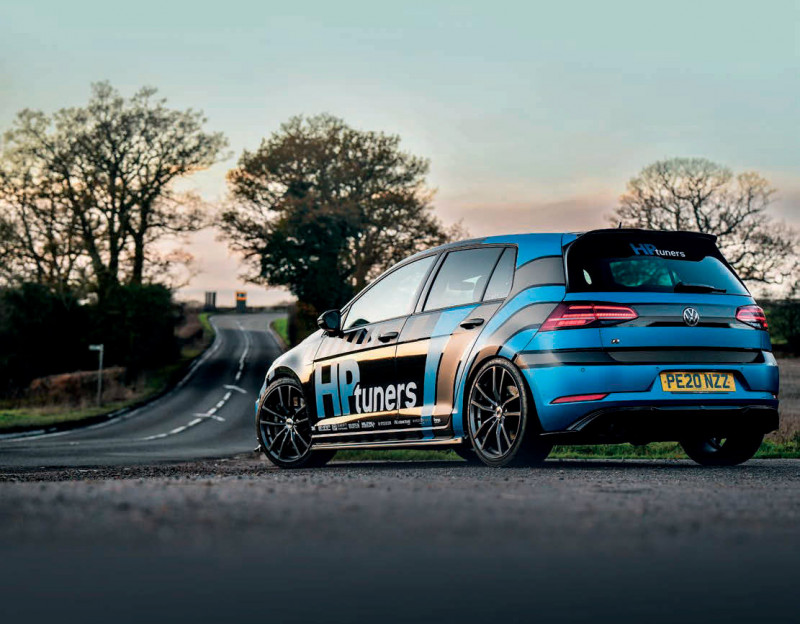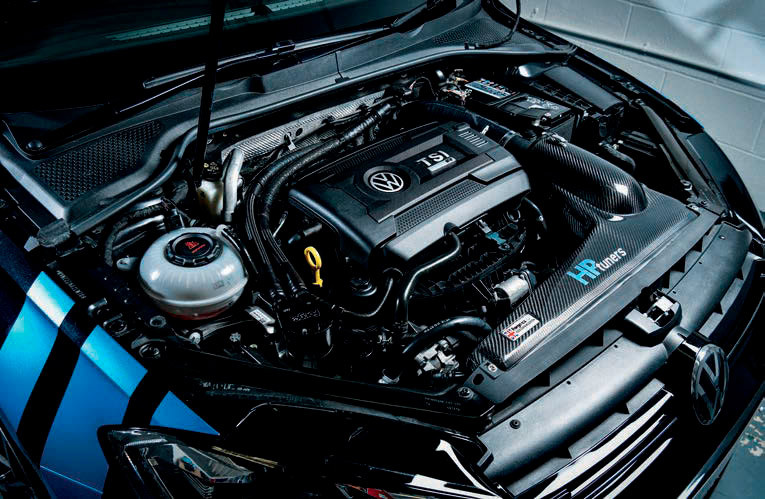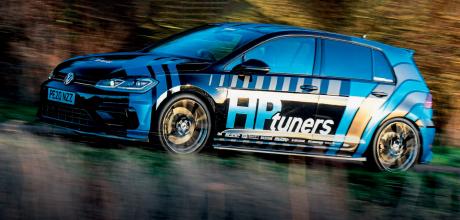HP Tuners 480bhp Volkswagen Golf R Mk7.5
HP Tuners have taken a stock Mk7.5 Golf R and — with a little help from its friends — have created their take on hot hatch heaven!
Words: ProMotiv
Photos: Chris Wallbank
TUNERS' CARS — THE APPLIANCE OF SCIENCE
Countless videos have been made poking fun at things that Americans find normal but that British people do not understand; and vice versa, of course. Because the truth is, despite speaking the same official language we often approach aspects of life and work from different angles.

The divide can be bridged, which is why we're glad Taco Bell can now supply customers with a tasty burrito from 100 outlets in the UK. But it can also fail, as evidenced by the appearance and disappearance from the UK of big American brands such as Chrysler and Chevrolet. So how has HP Tuners (HPT) – the largest provider of ECU diagnostic and calibration solutions in the US – tried to ensure that its products are a success in the UK and broader European market? By trying to think like Europeans.

Rather than assume British motorists would be bowled over with its many ECU solutions for muscle cars and dual-wheel pick-ups, the directors began their launch campaign by identifying the biggest-selling new car in Europe, which at the time was the Mk7.5 Golf, and then bought themselves the best version of that car, the awesome Golf R.
With that Euro-friendly super-hatch as their initial focus, HPT's engineers set to work creating ECU tuning solutions in the company's inimitable style. They were also aware that unlocking potential within the car's Siemens/ Continental ECU and 2.0-litre TFSI powertrain would open the door to a whole range of related models with EA888 engines, earlier EA113 TSI units with Bosch ECUs, as well as their DSG gearboxes.

It's amazing how one well-thought-out business decision meant that the VAG world was becoming HPT's oyster. But we also like to think that PVW has played a valuable part in raising awareness by following the progress of this Golf R project every step of the way. All of which has been leading to this point – its exclusive media reveal. Ta da!
Beautifully staged for its hero shots in the atmospheric environment of a pit garage, the modified Golf R looks dapper in its bold, corporate attire. The black base colour, graphical stripes and lettering have been beautifully translated from HPT's website, the blue satin vinyl especially doing a terrific job of reflecting the light to better reveal the Golf's carefully considered form.
Helping to frame this artwork is a subtle carbon fibre perimeter consisting of Maxton Design splitters across the front and sides, and Maxton Design diffuser and spoiler cap out back. These elements cut through the atmosphere a little closer to the ground than usual thanks to the fitment of Bilstein lowering springs, set around capable OE Golf R dampers. Specified for B-road compliance rather than a box-ticking scene stance, the body nevertheless hovers sweetly over its new rolling stock. Interestingly, the 19-inch Deutsche Räder Company DGR Gunmetal alloys look distinctly OEM+, as if they've been lifted straight from the chunkier T-Roc R, while the Nankang AS-2+ summer tyres have excellent wet weather performance that makes them an ideal choice for the changeable UK climate.
But the decision to fit new wheels wasn't solely about aesthetics. It was an opportunity to redress the balance between engine power and brake power; to ensure that the middle pedal has more bite to the brake discs than the clutch can exert on the flywheel. And given the Golf's predicted output, HPT went for the largest upgrade it could fit behind the wheel spokes – Forge Motorsport's 356mm six-pot big brake kit. Tempting as it may have been to accent the setup with the visual pop of a colourful caliper, the choice of a black anodised finish harmonises with the discreet but devastatingly effective theme going on under the bonnet. In fact, if there was a TCR version of the Golf R, this is what its engine bay would look like. There is no frippery, just down-to-business goodies from Forge Motorsport that deliver functional enhancement; though the fact that these aftermarket extras also look amazing is something of a bonus.
Leading the charge is Forge's elegant carbon fibre induction kit, which uses a full-width intake to suck air from the front of the car before ushering it into the cold side of the turbo via a free-flowing cone filter and high-flow intake hose. The fact that this process is shielded from the heat of the engine keeps the intake as cold, dense and nutritious as possible, yet not so isolated that it hasn't improved the intake roar – the very noise that makes the hairs on the back of your neck stand up.
As reliable and highly regarded as the Golf R's original IHI IS38 turbo is, tuners report that it tends to run out of puff at around 370bhp. In addition, the fact that it's a bolton unit functioning independently of other components makes it a prime candidate for a direct-fit upgrade, such as the Garrett Powermax turbo now installed behind the scenes. Crafted to offer the explosive power of a sprinter with the endurance capacity of a marathon runner, this twin-scroll unit has enough choke flow capacity within the compressor to support up to 600bhp.
That's more than twice as much power and airflow as standard. So a Forge uprated intercooler was installed to handle the flow and maintain intake temperatures below the threshold where the ECU begins to reign in ignition timing, boost… and fun. Plumbing in one of the company's blow-off valves between the turbo and inlet hose helps to keep the compressors on-song between gear changes, which fortunately is within the capabilities of the valve's piston-based internals given the speed of the DSG 'box. Similarly, running the Forge oil catch can kit between the positive crankcase ventilation system and intercooler allows only pure air to be ingested by the engine, where it is met with an proportionally increased volume of fuel from a VIS Motorsport pump.
Following combustion, the spent gases are efficiently evacuated through a Milltek stainless steel exhaust system, which transforms from delivering a deep, satisfying rumble at low revs to a banshee howl at the top end.
Having laid the foundation for power, the time finally arrived for the EA888 and its aftermarket upgrades to be fully optimised with HPT's amazing software. Like a parent handing over their precious child to be educated at boarding school, HPT commissioned super dealer Motorsport and Performance (MAP) in West Yorkshire to work their mapping magic through the OBD port using the powerful MPVI3 dongle – the physical interface between car and tuner. With an open line of communication forged between these two parties, MAP used a combination of HPT's intuitive VCM Suite software and operator experience to scan, diagnose, log and calibrate every engine parameter in real-time.
The result is astonishing. Tuned to the equivalent of stage three – a level that edges towards the limits of the engine and internals rather than the original ancillaries – the output is a dyno-proved 480bhp and 571 lb/ ft torque. Any powerplant that offers numerical equivalency between horsepower and torque is considered punchy, but those figures deliver a mind-blowing experience on the road. EV advocates talk about maximum torque being available at zero revs, and this has a similar feel. Except that where electric motors tend to tail off at speed, this engine is unrelenting, offering a brutal linearity of shove that is only reigned in by the driver's bravery. And yet when you aren't going for gold, the satisfying integration of every component and masterful mapping of the ECU makes the Golf R feel like a pussycat on the shopping run.
You can talk all you like about the theories of tuning and building the perfect demo car, but it is when things come together on the road that every little decision is vindicated. By adopting the European attitude and partnering with likeminded aftermarket companies, HP Tuners has done all it can to guarantee success on these demanding shores. Which makes us wonder: What's next in line?
DUB DETAILS
- ENGINE: EA888 2.0-litre four-cylinder 20v turbo, Garrett Powermax direct-fit turbo conversion, VIS Motorsport high-pressure fuel pump, Forge carbon fibre induction kit, Forge high flow intake hose, Forge uprated intercooler, Forge blow-off valve, Forge oil catch can kit, Milltek stainless steel exhaust system. Forge Motorsport dog bone bush insert for engine mount. DSG transmission
- PERFORMANCE: Tuned to Stage 3 for 480bhp, 571lb ft torque (standard is 296bhp, 280lb ft)
- CHASSIS: 8.5x19-inch DRC DGR Gunmetal alloys with 235/35 R19 Nankang AS-2+ tyres, Bilstein lowering springs around OE Golf R dampers. Forge Motorsport 356mm six-pot big brake conversion with EBC Yellow Stuff pads
- EXTERIOR: Maxton carbon fibre front splitter, side splitters, rear diffuser, rear spoiler cap. Joyce Design graphics using satin 3M vinyl
- INTERIOR: Standard Golf R, HP Tuners MPVI3 dongle when tuning
- CONTACT: HP Tuners Europe (hptuners.eu)
- SHOUT: PAAA and its member suppliers, Joyce Design for the 3M vinyl graphics, Modified 71 for the Maxton body kit, Swift Performance for the Bilstein suspension, Wheelwright for the DRC wheels and Nankang tyres, Forge Motorsport for the alloy engine components and big brake kit, Milltek for the exhaust system, MAP for fitting the Garrett turbo and tuning with HP Tuners software
Power is nothing without control — it's out on the open road that HP Tuners Stage 3 Mk7.5 comes into its own. It's not the size, but what you do with it, right? HP Tuners MPVI3 dongle makes tuning a doddle.


